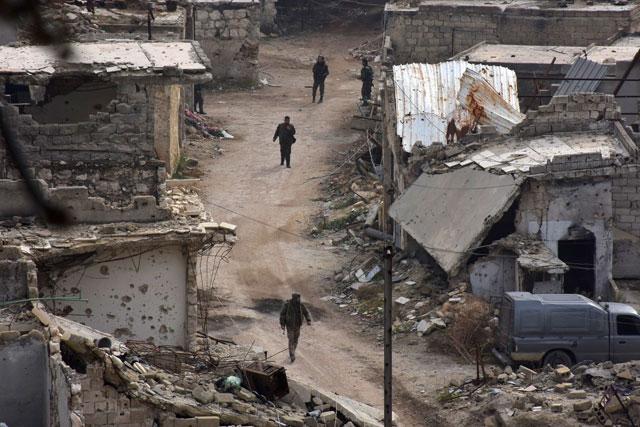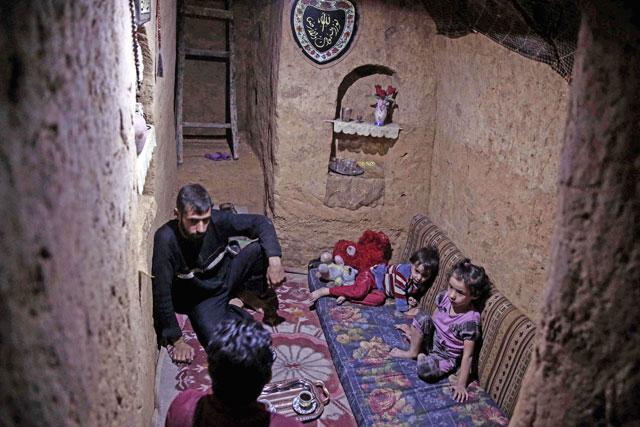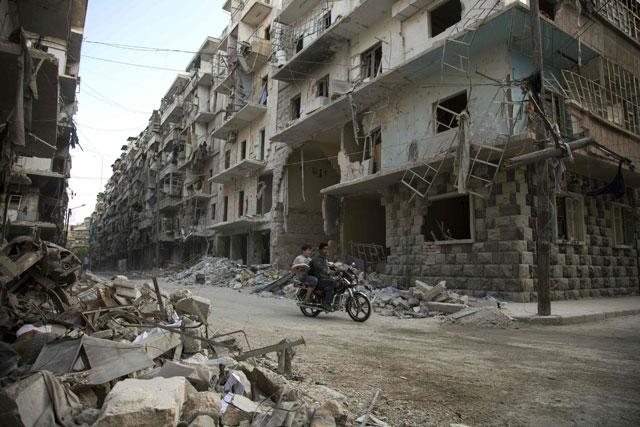You are here
Syrian troops close in on Aleppo’s Old City
By Reuters - Dec 06,2016 - Last updated at Dec 07,2016

Smoke rises following a reported Syrian government air strike on rebel positions, in eastern Aleppo, Syria, Monday (AP photo)
BEIRUT/GENEVA — Syria's army and allies closed in on areas near Aleppo's Old City on Tuesday, looking closer than ever to achieving their most important victory of the five year civil war by driving rebels out of their last urban stronghold.
Rebels said on Tuesday they would never abandon Aleppo, after reports that US and Russian diplomats were preparing to meet to discuss the surrender and evacuation of insurgents from territory they have held for years.
Russia said its Syrian government allies had taken control of five more districts of Aleppo, and had now seized 35 districts from the rebels during an advance that has changed the course of the conflict.
The government now appears closer to victory than at any point since 2012, the year after rebels took up arms to overthrow President Bashar Assad in a war that has killed hundreds of thousands of people, made more than half of Syrians homeless and created the world's worst refugee crisis.
The Syrian foreign ministry said it would accept no truce at this point in Aleppo, should any outside parties try to negotiate one. Russia and China vetoed a UN Security Council resolution on Monday calling for a week-long ceasefire. Moscow said rebels used such pauses in the past to reinforce.
Rebel-held districts of Aleppo, reduced to a few kilometres across, where tens of thousands of civilians are trapped, looks set to fall. The United Nations, whose staff are restricted to government-controlled areas of the city, on Tuesday described "a very disastrous situation in eastern Aleppo".
"There has been heavy shelling on us, there are massacres [of civilians], there's no electricity and little Internet access," said Abu Youssef, a resident of one of the areas still held by the fighters.
Damascus and Moscow have been calling on rebels to withdraw from the city, disarm and accept safe passage out, a procedure that has been carried out in other areas where rebels abandoned besieged territory in recent months.
Russian Foreign Minister Sergei Lavrov said talks with the United States on the withdrawal of rebels from Aleppo would begin in Geneva on Tuesday evening or Wednesday morning.
A US official told Reuters Washington would embrace the talks as a step to save lives.
But rebels have told US officials they will not withdraw, and said there had been no more formal contact with Washington on the topic since then.
“The Americans asked if we wanted to leave or to stay... we said this is our city, and we will defend it,” Zakaria Malahifji, a Turkey-based official for the Fastaqim rebel group, told Reuters on Tuesday.
The Cold War-era superpowers have backed opposing sides in the war, but Russia has intervened far more openly and decisively, joining Iran as well as Iraqi and Lebanese Shiite groups to back Assad.
Some of the groups fighting in eastern Aleppo have received support in a US-backed military aid programme to rebels deemed moderate by the West. However, this has been minimal compared to massive Russian air support to aid Assad’s government, which has turned the tide of the war in his favour over the past year.
The army said it had taken over areas to the east of the Old City including Al Shaar, Marja and Karm Al Qaterji, bringing them closer to cutting off another pocket of rebel control.
The British-based Syrian Observatory for Human Rights said Al Shaar and some other areas had been taken, but did not immediately confirm the takeover of all the areas announced by the army. A Turkey-based rebel official denied Al Shaar had been taken but said fighting continued in the neighbourhood.
‘We will defend it’
The rebels’ loss of the eastern half of Aleppo, Syria’s largest city before the war, would be the biggest victory of the conflict so far for Assad, securing his grip on all Syria’s main cities.
It would also be a success for President Vladimir Putin who intervened to save Moscow’s ally in September 2015 with air strikes, and for Shiite Iran, whose elite Islamic Republic Guard Corps has suffered casualties fighting for Assad.
UN official Jens Laerke said: “Winter is approaching, it’s already getting very, very cold so that has come up as a priority need ... Food is running out, the little food that is available is being sold at extremely inflated prices.”
While rebels have said they will not leave, one opposition official, who declined to be identified, conceded they may have no alternative for the sake of civilians who have been under siege for five months and faced relentless government assaults.
Insurgents, meanwhile, have fought back ferociously inside Aleppo. Some of the fighting took place within a kilometre of the ancient citadel, a large fortress built on a mound, and around the historic Old City.
With narrow alleyways, big mansions and covered markets, the ancient city of Aleppo became a UNESCO heritage site in 1986. Many historic buildings have been destroyed in the fighting.
‘Useful Syria’ and ‘Daeshistan’
Apart from their support for rebels fighting against Assad, Western countries are also taking part in a US-led air campaign against Daesh, the Sunni Muslim militant group which broke away from other anti-Assad groups to proclaim a caliphate in the territory in Syria and neighbouring Iraq.
Moscow says helping Assad is the best way to defeat Daesh. Western countries say the group gains strength from the fury unleashed by Assad’s military crackdown on his enemies.
France said on Tuesday that Russia’s strategy of helping Assad to divide the country would cement a radicalised Islamist threat within Syria and create lasting regional chaos.
“There is a logic of total war with incredible brutality of the Assad regime that aims at conquering useful Syria. It’s a dramatic situation that will only get worse,” French Foreign Minister Jean-Marc Ayrault told RFI radio.
France, a staunch backer of the anti-Assad opposition, will convene with foreign ministers of like-minded countries in Paris on Saturday to try to come up with some form of strategy in the wake of the Aleppo onslaught, although few diplomats expect anything concrete to be achieved.
“With this total war, it is the partition of Syria that is taking place with the risk that a ‘Daeshistan’ is created next to this useful Syria,” Ayrault, said.
Western countries say that even if government forces take Aleppo, they will still not be able to end the conflict, as long as millions of Syrians see the government as a brutal enemy.
“Aleppo falls, but the war goes on,” said one US official.
He and other current and ex-US officials argued that rebels who escape Aleppo would keep fighting, with some likely joining groups such as Jabhat Fateh Al Sham, formerly known as the Nusra Front, which Washington regards as Al Qaeda’s Syrian branch.
Other US officials warned the conflict could escalate as flagging US support for Assad’s opponents could prompt Saudi Arabia, Qatar and Turkey to intensify their military aid to rebel groups.
Related Articles
ALEPPO — Russia said Monday it would hold talks with Washington on a total rebel withdrawal from Syria's Aleppo, where the army has made swe
MOSCOW — Russian Defence Minister Sergei Shoigu said on Tuesday a Western failure to rein in violent Islamists in Syria had indefinitely del
AMMAN — A cessation of hostilities brokered by Russia and the United States brought a measure of relief to Aleppo on Thursday, but fighting



















